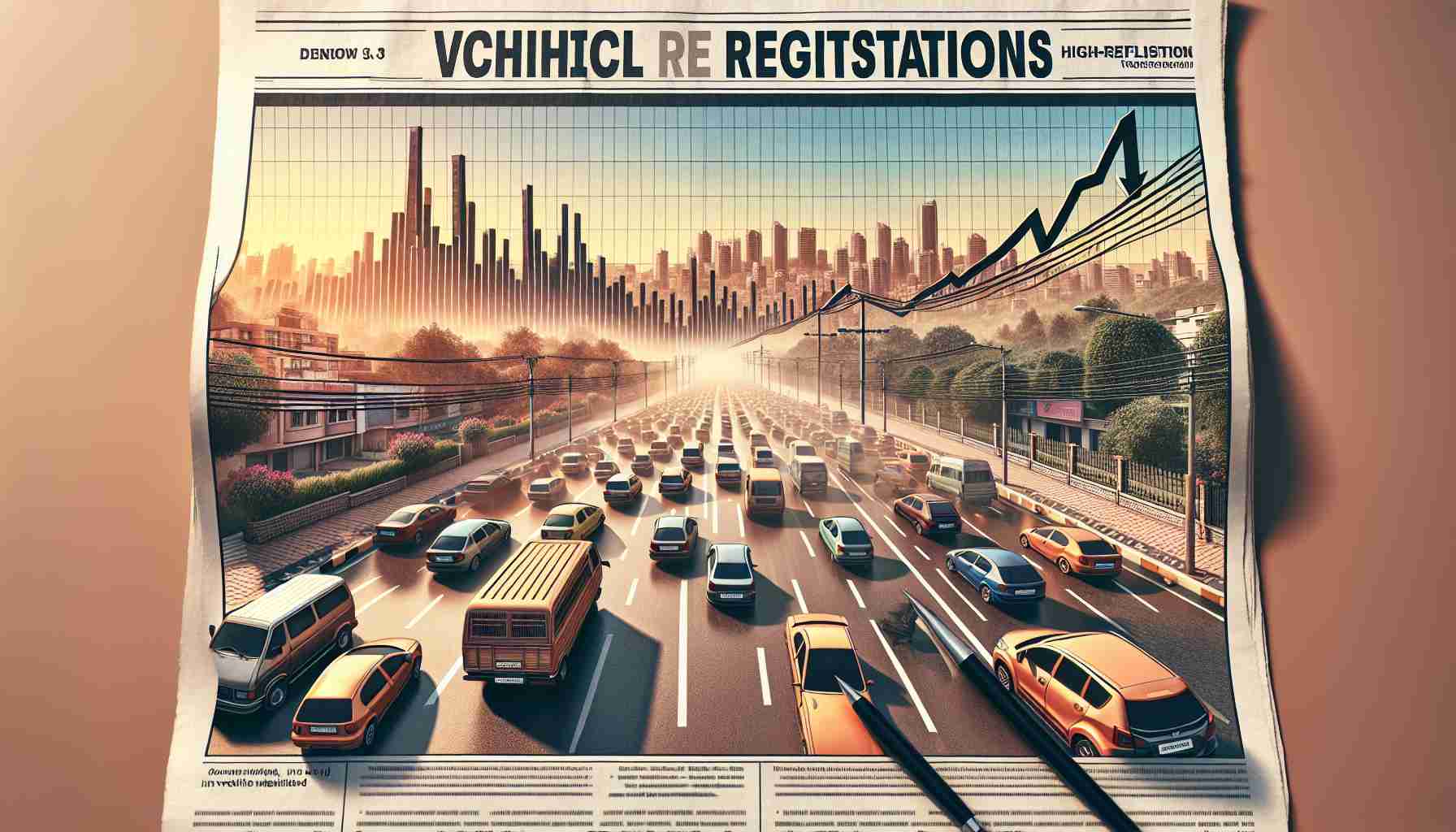Chandigarh Experiences Unprecedented Vehicle Registration Drop
In a surprising turn of events, Chandigarh, renowned for its exceptional vehicle ownership rate, witnessed a stunning 13% decrease in vehicle registrations in 2024 compared to the previous year. The most significant decline occurred in car registrations, marking a shift in the city’s transportation landscape.
Over the past three years, there has been a notable transition from traditional internal combustion engine vehicles to a growing interest in electric and hybrid models. Despite petrol vehicles still claiming the majority of the roads, their registration numbers have consistently fallen over recent years.
Following a commendable spike of 32% in registrations in 2022, a more modest growth of 4.58% was documented in 2023. However, the current year’s data shows a stark reversal, with total registrations plunging to a mere 46,344 vehicles.
The decline is predominantly attributed to the steep drop in car registrations, which fell from over 26,000 in 2023 to just under 20,000 in 2024. In contrast, two-wheeler registrations have remained relatively stable.
Electric vehicles, while still a small fraction of the total, showcased a remarkable 127% growth from 2022 to 2024. Efforts by the administration, including a halt on registering internal combustion two-wheelers, aimed to encourage EV adoption but have stirred controversy.
This shift highlights a pivotal moment in Chandigarh’s transportation narrative, reflecting both changing consumer preferences and policy impacts.
Redefining Urban Mobility: Implications Beyond Chandigarh
The significant 13% drop in vehicle registrations in Chandigarh is a microcosm of a broader global trend toward sustainable transportation. This shift not only transforms local commutes but also carries profound implications for societal values and the urban landscape. As cities like Chandigarh grapple with increased traffic congestion and pollution, there is a growing realization that redefining transportation is essential for healthier urban living.
Culture reflects this transition, with an increased appetite for electric vehicles (EVs) indicating a change in consumer consciousness. The remarkable 127% growth in EV registrations suggests that individuals are making more environmentally conscious choices, highlighting the integration of sustainability into daily routines. This trend echoes a global surge in green technologies, potentially impacting the automotive industry’s direction towards cleaner motor transport systems.
On a larger scale, the shift away from internal combustion engine vehicles may have significant environmental ramifications. A reduction in fossil fuel usage can contribute to lower greenhouse gas emissions, poignantly shaping the future of urban environmental policies. The decreasing reliance on petrol vehicles aligns with international commitments to combat climate change, as urban areas strive to meet stringent emission reduction targets.
Ultimately, this pivotal moment in Chandigarh’s vehicle registration dynamics may signal the emergence of a strategic framework for urban mobility that other cities worldwide could adopt. As cities embark on similar paths, we may witness a seismic shift in the global economy, prioritizing sustainable industries over conventional automotive practices while fostering innovation in the face of climate change.
Chandigarh’s Shift to Electric Vehicles: What You Need to Know
Chandigarh Experiences Unprecedented Vehicle Registration Drop
Chandigarh’s automotive landscape is undergoing a significant transformation, evidenced by a striking 13% decline in vehicle registrations for the year 2024. This decrease marks a significant pivot from its reputation as a hub of high vehicle ownership, with the most considerable impact felt in car registrations.
Key Highlights of the Change
1. Car Registrations Plummet: The total number of vehicles registered in Chandigarh fell to 46,344, with car registrations dropping from over 26,000 in 2023 to just under 20,000 in 2024. This shift signals a critical change in consumer sentiment and choice.
2. Stable Two-Wheeler Registrations: While car registrations have seen a dramatic decrease, the registration of two-wheelers has largely remained stable, indicating that commuters are adjusting rather than abandoning personal transport.
3. Electric Vehicle Growth: Despite still being a small segment of the market, electric vehicle (EV) registrations have surged with an impressive 127% growth from 2022 to 2024. This change points to an increasing consumer shift towards sustainable transportation options.
The Factors Behind the Decline
– Policy Changes: The Chandigarh administration has instituted measures aimed at promoting electric vehicles, such as halting the registration of internal combustion engine two-wheelers. These policies, while encouraging for EV adoption, have sparked controversy among traditional vehicle owners.
– Shifting Preferences: Consumer attitudes are evolving, with a noticeable trend towards environmentally friendly options. The drop in petrol vehicle registrations reflects a growing awareness and preference for sustainable transportation solutions.
Pros and Cons of the Current Trend
Pros:
– Increased adoption of electric vehicles can lead to reduced air pollution and lower greenhouse gas emissions.
– Growth in the EV market creates opportunities for new businesses and innovations in electric vehicle technology.
Cons:
– Traditional vehicle owners may feel pressured by new regulations, leading to dissatisfaction and potential economic implications for the automotive sector.
– The infrastructure for electric vehicles, while improving, may not yet adequately support a sudden surge in demand.
Predictions for the Future
As Chandigarh moves forward, we can anticipate several trends:
– Increased EV Infrastructure: Expect further investments in charging stations and support systems for electric vehicles as the government aims to encourage wider adoption.
– Continued Decline in ICE Vehicles: The trend away from internal combustion engine vehicles is likely to continue unless policies change dramatically.
– Market Growth: The electric vehicle market in Chandigarh has the potential to expand as more consumers become aware of the benefits and as the technology becomes more accessible.
In conclusion, Chandigarh’s automotive scene is not merely experiencing a decline but perhaps preparing for a renaissance centered around electric mobility. This evolving landscape will require careful navigation by consumers, policymakers, and industry stakeholders alike.
For further insights into the transportation trends in Chandigarh, visit Chandigarh Government.








